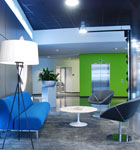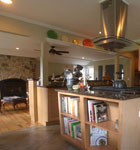At a Glance
Location
Bloomington, IN
Founded
1965
Employees
28 full-time
Specialties
Affordable-housing property management, sustainable renovations, and rent-assistance program management
Striving to be a catalyst in the creation of strong communities and families in its own city, the Bloomington Housing Authority (BHA) in Indiana sets the bar for other public housing organizations thanks to a sound business philosophy. The organization’s business practices include sustainable property renovation, extensive staff training, and client programs that help families move toward self-sufficiency.
It’s successful now, but BHA faced several challenges in the past decade. In 2004, the organization had been without an executive director for more than a year, was suffering from negative perceptions within the community, had a staff with little training, and owned numerous properties suffering from neglect. But then, current executive director Jennifer Osterholt came on board. With almost two decades of expertise in public housing administration, Osterholt revitalized not only the organization but also its mission and properties.
“My primary focus when I started was to create a 10-year master plan to set our organization on a better path,” Osterholt says. “Our projects since that time have focused on improving capital assets, curb appeal, resident programs, financial planning, and staff training while creating community partnerships that further our overall mission.”

BHA was created under state statute in 1965 and completed its first development in 1967. Currently, the authority owns and administers 310 units of conventional public housing, and more than 40 percent of its tenants are elderly or disabled. The organization also administers 1,284 Section 8 rent-assistance vouchers for Monroe County and oversees a very active family self-sufficiency program, an area Boys & Girls Club, a full-day Head Start program, and a GED / adult-education program.
Now halfway through its 10-year plan, BHA remains focused on updating its properties by administering various grants and capital funds from the Department of Housing and Urban Development (HUD). “When I started, it was clear we’d need to secure new funding methods to help underwrite the work which needed to be done,” Osterholt says. Through new grants and other partnerships, BHA secured $3.8 million in funds, and as a result it began renovations on two of its properties—the Reverend Butler and Crestmont apartments—adding many sustainable elements such as energy-efficient lighting and high-efficiency furnaces.
“This grant also allowed us to educate our residents about energy savings and eco-friendly lifestyles,” Osterholt says. “For example, BHA provides a bucket of green cleaning products when residents move into the newly renovated units at Crestmont.” Even more impressive is that since beginning the eco-friendly improvements on its properties in 2008, BHA has seen almost $400,000 in energy savings.

Another key business practice for BHA has been self-improvement, largely through increased investment in staff training and renovations to its administration building. The organization spent $25,000 to increase staff knowledge, establish specific standards of professional behavior, and assist employees in learning core competencies. “We also completed a $600,000 office renovation early in my tenure and now have adequate space to serve clients with respect and dignity,” Osterholt says. “Improving our curb appeal throughout all sites has improved our overall community perception and fostered the perception that you must be a good neighbor to be a BHA resident.”
BHA also continues to address numerous quality-of-life issues with its residents, and just recently the organization expanded its GED / adult-education program. “We are focused on improving our properties, but we also continue to improve our programs for both children and adults,” Osterholt says. “Our intent is to help our residents begin to become part of the larger community rather than segregated from the community at large, and our focus will continue to be on using green and energy-efficient technologies that lead to an improved quality of life.” ABQ


